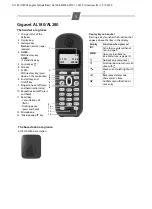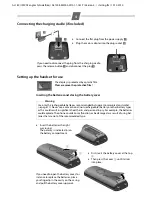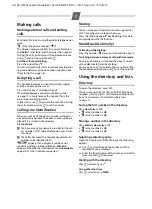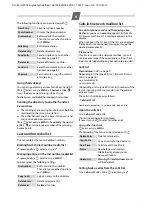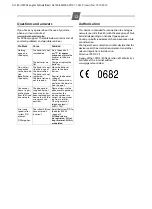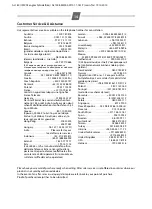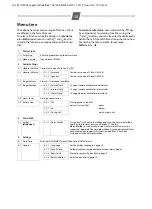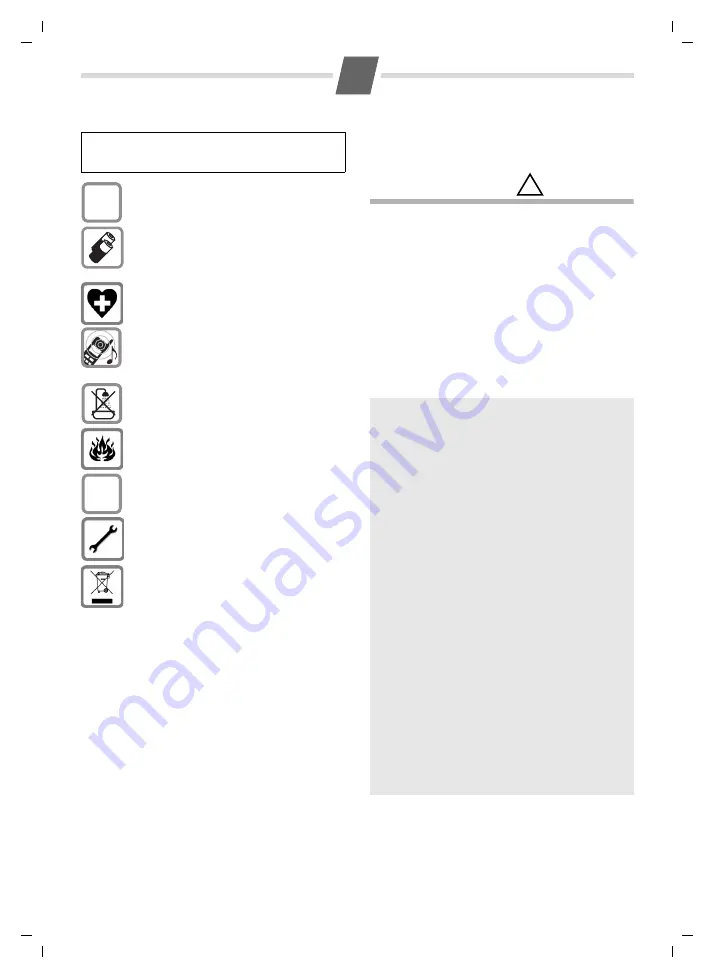
2
AL180 / IM ZAF englisch (Südafrika) / A31008-M2003-W101-1-7619 / Overview.fm / 19.10.2010
Safety precautions
Emergency numbers cannot be dialled if the keypad lock
(
page 1) is activated!
Not all of the functions described in this user guide are avail-
able in all countries.
Care
Wipe the device with a
damp cloth
or an
antistatic
cloth
. Do not use solvent or a microfibre cloth.
Never
use a dry cloth as this can cause static.
Contact with liquid
If the device comes into contact with liquid:
u
Unplug the power supply
and/or
remove the
battery
from the handset
immediately
.
u
Allow the liquid to drain from the device.
u
Pat all parts dry. Place the device (handset with
the battery compartment open and the keypad
facing down) in a dry, warm place
for at least 72
hours
(
not
in a microwave, oven etc.).
u
Do not switch on the device again until it is com-
pletely dry.
When it has fully dried out, you will normally be able
to use it again.
Read this user guide and the safety precautions carefully
before use. Explain their contents and the potential hazards
associated with using the telephone to your children.
Only use
the mains unit supplied
.
Fit only the
recommended, rechargeable
batteries
page 11), i.e. never use a conven-
tional (non-rechargeable) battery or other battery
types as this could result in significant health risks
and personal injury.
The operation of medical appliances may be
affected. Be aware of the technical conditions
in your particular environment, e.g. doctor's sur-
gery.
Do not hold the rear of the handset to your ear
when it is ringing. Otherwise you risk serious and
permanent damage to your hearing.
The handset may cause an unpleasant humming
noise in hearing aids.
Do not install the phone in a bathroom or shower
room. The handset and base station are not
splashproof.
Do not use your phone in environments with a
potential explosion hazard, e.g. paint shops.
If you give your Gigaset to someone else, make
sure you also give them the user guide.
Please remove faulty base stations from use or
have them repaired by Service, as they could inter-
fere with other wireless services.
Disposal
Batteries should not be disposed of in general
household waste. Observe the local waste dis-
posal regulations, details of which can be obtained
from your local authority or the dealer you pur-
chased the product from.
All electrical and electronic equipment must be
disposed of separately from general household
waste using the sites designated by local authori-
ties.
If a product displays this symbol of a crossed-out
rubbish bin, the product is subject to European
Directive 2002/96/EC.
The appropriate disposal and separate collection
of used equipment serve to prevent potential
harm to the environment and to health. They are a
precondition for the re-use and recycling of used
electrical and electronic equipment.
For further information on disposing of your used
equipment, please contact your local authority,
your refuse collection service or the dealer you
purchased the product from.
$
ƒ
ECO DECT
You are helping to protect the environment with
your Gigaset AL180/AL280.
Reduced energy consumption
Your telephone has an energy-saving adapter plug
and uses less energy.
Reduced transmission power
The transmission power of your telephone is
reduced
automatically
:
The
handset's
transmission power is reduced
depending on the distance to the base station. The
transmission power
on the base station
is reduced
to virtually zero when only one handset is regis-
tered and the handset is in the base station.
You can reduce the transmission power of the
handset and base station
even more
by using
Eco
Mode/Eco Mode+
(see Menu tree page 16):
u
Eco Mode:
80% transmission power reduction
in standby mode and during a call (the range of
the base station is reduced).
u
Eco Mode+:
100% transmission power deacti-
vation in standby mode (top left display icon
½
).
Press and hold
the talk key
c
to check that the
base station can be reached. You will hear the
ringing tone if the base station can be reached.
!

